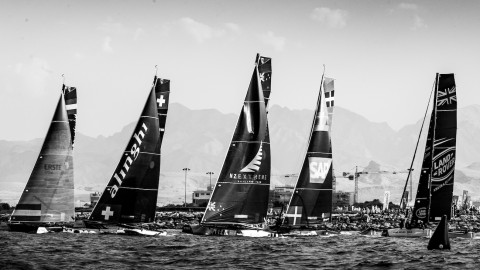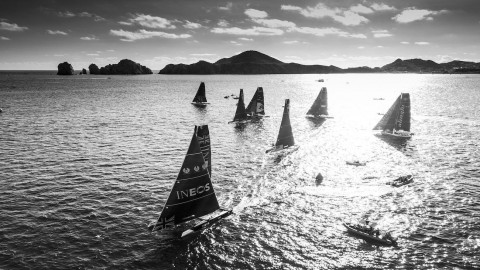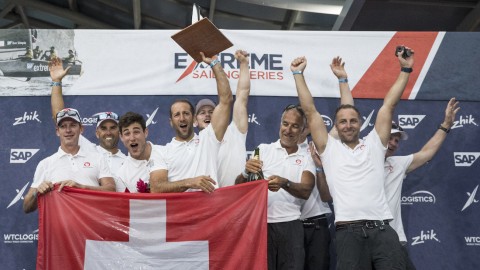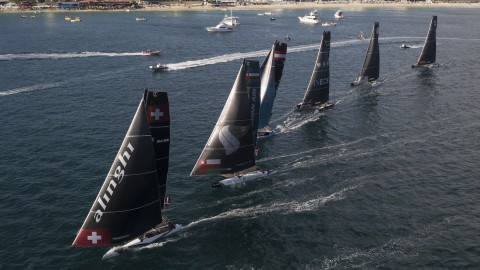Britain’s Golden Girl
She is one of Britain’s golden girls of sailing with two Olympic gold medals to her name and she is enjoying a new lease of life on the water through her involvement with the Extreme Sailing Series™.
Thursday 9th April 2015

She is one of Britain’s golden girls of sailing with two Olympic gold medals to her name and she is enjoying a new lease of life on the water through her involvement with the Extreme Sailing Series™.
Sarah Ayton was famously one of what the British press dubbed the “three blondes in a boat” when, alongside skipper Shirley Robertson and Sarah Webb she won gold in the Yngling class at the Athens Olympics in 2004. Stepping up to lead her own campaign, she repeated the feat alongside Sarah Webb and Pippa Wilson at Beijing four years later.
Joining the crew of Leigh McMillan’s The Wave, Muscat at the beginning of the 2014 Extreme Sailing Series as tactician, marked a return to front line professional sailing for Ayton who had stepped back for a few years to concentrate on bringing up her two young boys, Thomas aged five and Oscar three.
The invitation from Extreme 40 legend McMillan was one she could hardly turn down, even if racing on superfast catamarans in a stadium setting came as a considerable shock to a women whose previous competitive experience was dominated by a relatively traditional and slow monohull.
But Ayton loves the cut and thrust of Extreme 40 racing and the rhythm of each day at an Extreme Sailing Series Act which she compares to the intensity of “medal races” – the final medal-deciding heats at the Olympics. “It’s full-on but I love the racing – it’s like eight medal races in a day and every day,” she said as she prepared for the 2015 campaign with two-time Series winner McMillan.
“There is an intensity about getting the boat round the course as fast as possible without making a mistake,” she added. “Then there’s the decision-making process - the ability to make them really quickly and well is critical. The quality of the fleet last year was outstanding and this year looks like it will be the same with some good established teams and some new talent coming on, so it’s really competitive which is a real pull for me.”
The buzz Ayton has got from working with McMillan and his crew, that includes fellow Brit Pete Greenhalgh on mainsail, has inspired Ayton to dream of perhaps a return to an Olympic campaign for Rio in 2016. At the time of writing she was considering a tilt at a third Olympic medal either in the 49erFX or the Nacra 17 catamaran. “You never know, I don’t think it’s too late but the clock is definitely ticking, so if it is going to happen, it needs to happen pretty soon,” she said.
Ayton is fascinating when talking about her role on The Wave, Muscat. Her main job is to interpret the bigger picture outside the boat and provide McMillan with an overall race strategy, to compliment what she calls the “in the moment” decisions that he is making on the helm. She looks at wind conditions, where the boat is on the course relative to rounding marks and laylines and where their rivals are and what might be coming up ahead. Her goal is to help McMillan and Greenhalgh reach the right tactical conclusions under pressure by giving them the right information. It’s an evolutionary process and Ayton reckons they have not perfected it quite yet – a worrying state of affairs for The Wave, Muscat’s rivals.
“Things happen quickly and there is some boat-on-boat stuff that Leigh leads on, but the rest of it we are still trying to get to the point where a decision evolves through good information,” Ayton explains. “That’s what we are striving for - to get the loop of communication really solid so that those decisions are easy. The speed differences between the boats are so big at any moment across the course that you have to be prepared to change your mind at the last minute. Sometimes there’s quite a lot of pressure on those decisions, so you are very much trying to get that loop solid.”
When calls go awry, Ayton tries to keep a sense of perspective to help reach the right outcome. “I try to be a calming influence,” she says. “I pride myself on the teamwork side of things – I enjoyed that in the Yngling campaign and I try to keep things pretty cool on the Extreme 40. When decisions are wrong, I try to figure out what’s missing and how we can address it.”
Ayton has no doubt that her experience in the Olympics – even in a vastly different boat – helped give her the mental toughness and resilience that she needs in the Extreme 40 fleet. But she has noticed that there is something different about sailing with an otherwise all-male crew that marks it out from her previous racing experience. “I can’t really describe it,” she said pausing. “It’s just different sailing with the boys somehow – it’s not the level of intensity because in the Yngling we were fully intense. I don’t know if it isn’t more aggressive maybe – and that’s really interesting and really enjoyable.”
Apart from her role as tactician, Ayton also busies herself on the boat assisting bowman Nasser Al Mashari with the gennaker and running round preparing for sail manoeuvres - she is the lightest on board after all. It is hard work and Ayton puts her back into it spending hours in the gym at home between Acts to ensure, as she put it, that she can “make a difference” when it comes to sail handling.
Officially Ayton is part of The Wave, Muscat team as “fifth crew” – a concept introduced in 2012 providing a platform for female sailors, young up and comers under 25 years of age and amateurs get a chance to benefit from the unique Extreme Sailing Series experience. Ayton is a big supporter of the idea which she says has been good for women sailors and also for youngsters trying to make the leap to world racing. But she doesn’t see herself as an “extra” in any way on board The Wave, Muscat. Far from it. “Oh yeah, I’m definitely a member of the crew,” she says laughing. “I don’t even think about it as fifth crew – for me, I hold my own in the boat and without me they would really miss me,” she adds amid more laughter.
In her Olympic days, Ayton says that at times she took life too seriously, though her success suggests that was the right approach. She is enjoying her sailing more now and loves the atmosphere around the Extreme Sailing Series circuit that she says is like a big family reuniting every few weeks at different venues around the world. But the friendliness goes on hold once it is time to race.
“You get down to the boat and it’s approaching time to leave and you put your ‘game face’ on and you are ready for action,” she says. “It’s cut-throat as soon as you leave the dock.”




